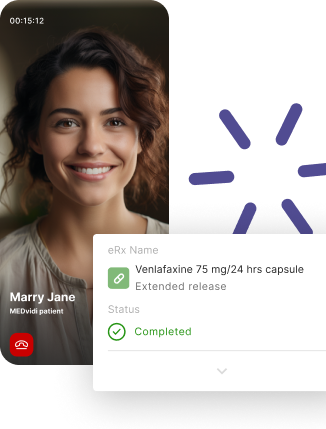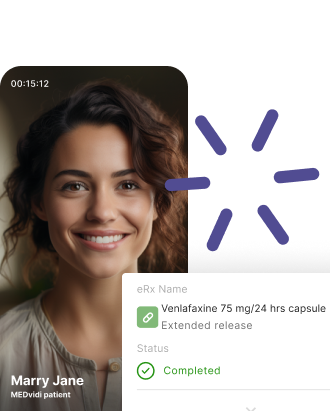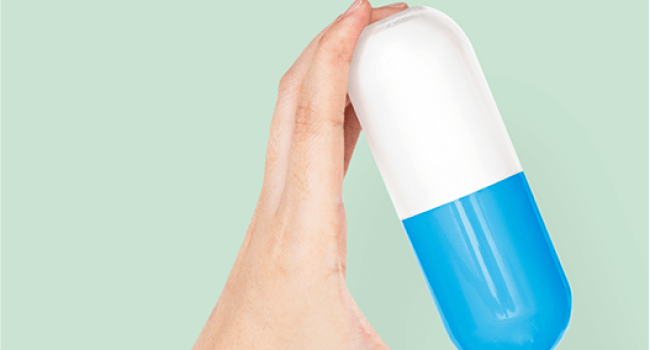Xanax has a boxed warning, the most serious type of warning from the Food and Drug Administration (FDA). Xanax’s active ingredient alprazolam has an increased risk of abuse, misuse, addiction, dependence, withdrawal reactions, and even death. Concomitant use of Xanax and opioids poses danger. Xanax is also a controlled substance, indicating its high potential for misuse or dependence. Specific federal and state laws limit the amount of this medication that can be prescribed or dispensed within a certain period of time.
Highlights
- Xanax (alprazolam) is a benzodiazepine medication prescribed for short-term anxiety treatment.
- Getting prescribed Xanax online is only possible after a consultation with a healthcare provider and if deemed appropriate.
- Xanax can cause side effects and has several contraindications. Remember to discuss these with your healthcare provider.
Brand name: Xanax, Xanax XR
Generic name: Alprazolam
Drug class: Benzodiazepines
Dosage forms: Oral tablet
FDA-approved uses: Generalized anxiety disorder; panic disorder, with or without agoraphobia
Anxiety disorders are some of
Xanax is a prescription medication. It is also a controlled substance, which means it has risks of dependence and misuse and requires close monitoring by a healthcare provider. At MEDvidi, you can consult a licensed provider to find out if Xanax is appropriate for you and get a prescription online, if clinically needed. Read on to learn the details of this process.
Note that booking an appointment doesn’t guarantee obtaining a prescription. The decision is at the discretion of your healthcare provider.
Can You Get a Xanax Prescription Online?
Yes, it is possible to get Xanax prescribed online. A licensed healthcare provider can prescribe Xanax through a telehealth appointment after a detailed evaluation. It’s important to remember that receiving a prescription at your appointment is not guaranteed; you may be offered alternative treatments if they can help your symptoms better or if you have contraindications.
Also, because Xanax is a Schedule IV controlled substance, you may need to see your healthcare provider more often in order to get refills of your medication.
How to Get a Xanax Prescription Online
At MEDvidi, an online prescription for Xanax can be obtained after a detailed assessment. Our medical providers are authorized to prescribe anxiety medication online if the patient’s condition requires such treatment. Here is what’s involved in this process.
Step 1: Sign up and book an appointment
Create an account on MEDvidi and complete an intake form to prepare for an appointment with a healthcare provider. This form will collect information about your symptoms, medical history, and current medications. You’ll then select a convenient appointment time.
Step 2: Undergo evaluation and get a treatment plan
During a telehealth appointment, a licensed healthcare provider will assess your anxiety symptoms, your treatment goals, and discuss treatment options. They will determine if Xanax is appropriate for you and if so, they will provide a prescription.
Step 3: Online prescription and pharmacy fulfillment (if appropriate)
If your healthcare provider believes Xanas is appropriate, they will send a prescription electronically to a pharmacy. They may even be able to use an online pharmacy that will deliver the medication to you.
Step 4: Follow-ups and adjustments
Follow-up appointments will be scheduled to monitor your response to treatment and provide medication refills if necessary.


What Is Xanax?
Xanax (alprazolam) is a type of medicine called a benzodiazepine. It is primarily used for short-term treatment of anxiety and panic disorder. Xanax works on GABA, a neurotransmitter that can help to regulate excessive brain activity. This can help to calm the nervous system and improve anxiety symptoms.
Xanax is a controlled substance and is only available with a valid prescription from a licensed healthcare provider. It is not considered a first-line or long-term anxiety treatment but may be useful for certain people.
Who Xanax Is and Isn’t For
Xanax is often prescribed for short-term treatment of generalized anxiety disorder and panic disorder with or without agoraphobia. Generalized anxiety disorder is associated with marked worry and anxiousness for prolonged periods. Panic disorder is characterized by panic attacks that cause intense feelings of terror or fear.
Xanax may also be prescribed off-label to some
The off-label use of Xanax for depression is highly controversial because it has a high potential for abuse and may worsen depressive symptoms in some individuals.
While Xanax can effectively manage some mental health conditions, certain individuals should not use it. Others may require careful consideration and monitoring when taking it. For example, people with respiratory issues, liver or kidney problems, and a history of substance abuse. Because Xanax is a benzodiazepine, it has an extremely high potential for abuse and dependence.
Because of its sedative effects and the high risk of misuse and abuse, it is prescribed cautiously and for intermittent and short-term use, often not exceeding two weeks in duration. In addition, taking Xanax during pregnancy is generally not advised due to potential hazards to the growing fetus. The medication might also enter the breast milk and impact the nursing child. Consult your healthcare provider to know what medication is suitable in this case.
Remember to discuss your medical history with your healthcare provider, including any health conditions and medications you are taking, to avoid interactions and learn more about contraindications and risks.

Who Can Prescribe Xanax?
Since Xanax is a controlled substance, only licensed medical professionals can prescribe it. Obtaining Xanax without a prescription is illegal.
In the United States, psychiatrists, medical doctors, and advanced practice medical professionals, such as nurse practitioners and physician assistants, can prescribe it. The list of authorized professionals may vary depending on state laws. Xanax can be prescribed both at in-person and telehealth appointments.
Medical providers at MEDvidi are authorized to prescribe Xanax after an online consultation for anxiety in
Xanax Risks and Side Effects
Xanax, like all medications, can cause side effects. Common side effects include:
- Drowsiness
- Dizziness
- Confusion
- Low blood pressure
- Impaired coordination
- Memory problems
Serious Xanax side effects that may require immediate medical treatment include:
- Dependence
- Withdrawal symptoms
- Respiratory depression (problems breathing)
- Overdose, especially if taken with opioids or alcohol
This is not a complete list of side effects or risks. Talk with your healthcare provider about all possible side effects before you start Xanax or any medication.
Precautions and Interactions
Certain individuals may not be able to take Xanax safely, including those with respiratory issues, liver or kidney problems, and a history of substance abuse. Tell your healthcare provider about your entire health history and about all prescription or over-the-counter medications, herbs, or supplements that you take so they can make sure Xanax is safe for you.
Other sedatives, anticonvulsants, certain antibiotics, antifungal medicines, and some antidepressants can all interact with alprazolam. These combinations may intensify negative effects or alter the metabolism of Xanax or co-administered medications. Also, using benzodiazepines like Xanax together with opioids is dangerous: it can lead to stronger sedation, respiratory depression, coma, and even death.

Xanax Dosage and How It’s Taken
According to the label, Xanax dosage can differ depending on the condition, medication form (immediate-release or extended-release), sensitivity to the effects of alprazolam, and the need for early discontinuation. Your healthcare provider will choose an appropriate individualized dosage based on your symptoms, health history, and treatment goals. They will also instruct you on dealing with missed doses and provide other necessary instructions.
Please contact your healthcare provider if you notice the symptoms of dependence and misuse:
- preoccupation with the medication,
- severe withdrawal symptoms when stopping the treatment,
- the desire to take higher doses, and other disturbing behaviors.
Xanax is taken by mouth and may be taken with or without food. Follow your healthcare provider’s instructions on how to take Xanax. It is important that you do not take Xanax more often or take a higher dosage than they instruct you to do, so that they can be sure that the medication is safe for you.
Xanax Cost and Insurance
Different factors can affect the cost of Xanax tablets, from the prescribed dosage to your location to insurance coverage (including varied policies and requirements of different insurance providers).
For example, the cost of 30 Xanax tablets of 0.25 mg ranges from $184 to $208, while the same supply of 0.5 mg tablets will cost from $237 to $260, depending on the pharmacy. Generic Xanax (alprazolam) 0.5 mg costs from $14 to $28 for 30 tablets.
You can decrease the cost of brand and generic Xanax by using coupons. These prices are cash, or what you would pay without using insurance. Based on your insurance coverage, your cost may vary. Your insurance may also require a prior authorization to approve Xanax, which MEDvidi also provides if you get prescribed this medication.
Note that these are not exact prices, and it’s recommended to contact your pharmacy to get the most up-to-date information.
Xanax is a controlled substance. Because of this, you may be limited to the amount of Xanax you can get from a pharmacy at one time, according to your prescription.
Alternative Treatments for Anxiety
Depending on the diagnosis and individual health history, a medical professional may prescribe other benzodiazepines, such as Valium (diazepam) or Ativan (lorazepam), or non-benzodiazepine alternatives for anxiety management. However, benzodiazepines are usually prescribed for short-term treatment of anxiety because they carry risks of tolerance and dependency. They may not be suitable for individuals with a history of substance abuse or certain health conditions, such as respiratory issues, sleep apnea, and liver disease.
For long-term anxiety management, it’s more common to consider the following options:
- Selective serotonin reuptake inhibitors (SSRIs): sertraline (Zoloft), fluoxetine (Prozac), escitalopram (Lexapro). They are not habit-forming and can be used over a longer period compared to benzodiazepines.
- Serotonin-norepinephrine reuptake inhibitors (SNRIs): venlafaxine (Effexor) or duloxetine (Cymbalta).
- Buspirone: has lower risks of dependency and sedation compared to benzodiazepines.

Pharmacological treatment combined with psychotherapy can lead to better results. Talk therapy itself, such as dialectical behavior therapy (
In addition, your healthcare provider may recommend lifestyle changes. For example,
The Bottom Line
Today, it’s possible to consult with a licensed healthcare professional online, who may prescribe medications like Xanax if deemed medically appropriate. They will evaluate your symptoms, make a diagnosis, and offer a course of treatment.
Contact MEDvidi to consult with a qualified medical provider and receive an evidence-based treatment plan for anxiety, including an online medication prescription, if needed.
FAQ
Why won't doctors prescribe Xanax?
How can I legally get Xanax?
Can I buy Xanax online?
You can only purchase Xanax online from a legitimate pharmacy if you have a prescription provided by a licensed medical professional. Online pharmacies that sell prescription medications without valid prescriptions may be operating illegally and may offer products that are fake or of poor quality. Self-medication without appropriate medical supervision can also be harmful to your health. For Xanax to be obtained legally and safely, it is imperative to speak with a healthcare provider and receive a valid prescription.
What to say to get prescribed Xanax?
It is not recommended to approach a healthcare provider with the intention of obtaining a particular medication like Xanax. Instead, discussing your symptoms and concerns openly and honestly is important to choose the right treatment that has the potential to help you best. Describe your symptoms and how they affect your daily life — your provider will evaluate your condition, consider various treatment options, and prescribe medication if appropriate.
Can I receive a Xanax prescription while on Suboxone treatment?
Because of safety concerns, patients must provide a letter from their clinician indicating that it is appropriate for them to receive a benzodiazepine medication like Xanax while taking Suboxone. Concurrent use of Xanax and Suboxone
Does MEDvidi prescribe Xanax?
Can urgent care prescribe Xanax?
In rare cases, an urgent care provider can prescribe a limited amount of Xanax, for example, to help alleviate a severe panic attack. However, it is not a common practice. It is important to see your general healthcare provider or a mental health specialist to get personalized treatment for anxiety, which may include medication prescription, and address the root causes.
Can a nurse practitioner prescribe Xanax?
Yes, a nurse practitioner may be able to prescribe Xanax if authorized by state law.
How to get prescribed benzodiazepines instead of SSRIs?
Talk with your healthcare provider about your symptoms. They will determine if a benzodiazepine, an SSRI, or a different medication may be able to help your symptoms. Note that the final decision is at the discretion of your healthcare provider.













